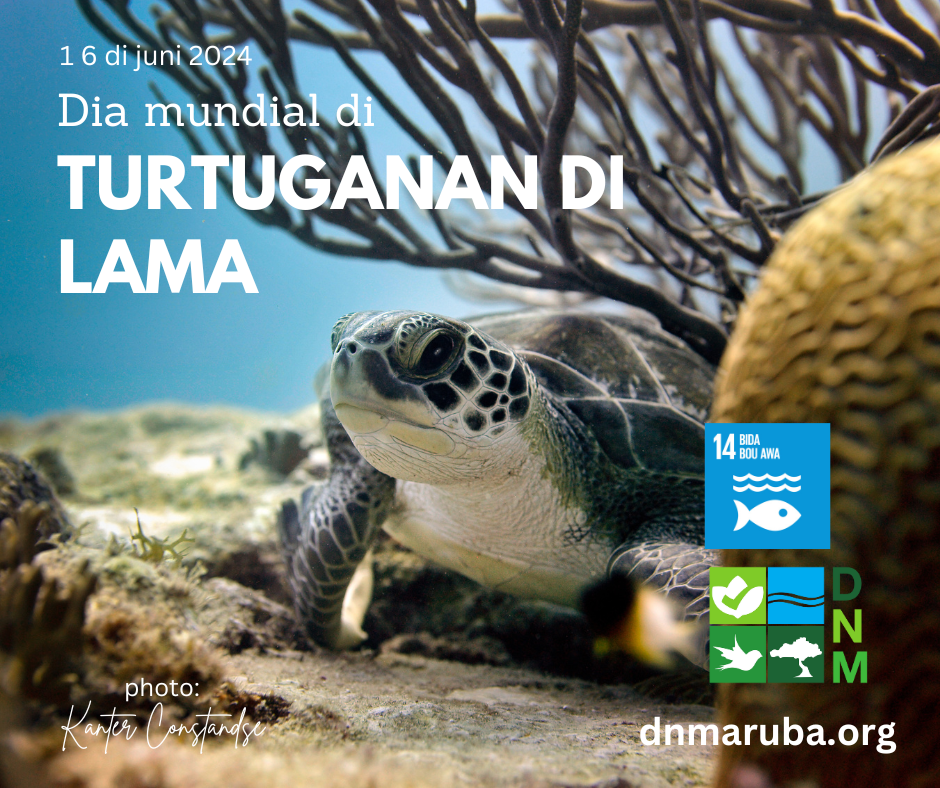On June 16, we celebrate World Sea Turtle Day. The Directorate of Nature and Environment (DNM) wants to emphasize that all six species of sea turtles are protected by local law under the “Landsbesluit Bescherming inheemse flora en fauna”.
These protected species are: the Hawksbill (Eretmochelys imbricata), Loggerhead (Caretta caretta), Green Turtle (Chelonia mydas), Leatherback (Dermochelys coriacea), Kemp’s Ridley (Lepidochelys kempii), and the Olive Ridley (Lepidochelys olivacea).
Every year, sea turtles come to our beaches and face many challenges due to human activities. These include motorized vehicles such as boats and waverunners, which are not careful around the sea turtles.
Hotels also do not comply with regulations regarding the placement and removal of the beach chairs used by tourists. Another factor playing a role recently is beach events with excessive use of artificial lights, which illuminate and confuse the sea turtles coming ashore. This is classified as light pollution. For this reason, DNM has published the regulation “standard operating procedures (SOP)” for lighting, promoting practices that are safe for animals like sea turtles. We invite everyone to review these procedures, available on our website dnmaruba.org.
In addition to the human activities mentioned above, there is also the issue of plastic pollution. This is crucial when discussing the consequences that lead to the death of sea turtles. Plastic is the cause of many problems in marine life worldwide, and because of it, these beautiful creatures are disappearing in large numbers.
We have all seen photos of the dead sea turtle in our waters that looks too round, indicating that this sea turtle likely has plastic in its stomach. The turtle still appears to be feeding in the depths, but soon, with an inflamed belly, it will rise to the surface and die. It is good for everyone to reflect on their consumption. The impact should not only be emotional but also lead to changes in consumption patterns, stopping the use of single-use plastic items.

Here are some facts about sea turtles:
- Artificial lights cause disorientation in sea turtles, leading them in the wrong direction when they come ashore to lay eggs.
- Female sea turtles return to the same beach where they were born. They are highly sensitive and have an incredible ability to navigate long distances.
- Sea turtles do NOT have teeth, but their jaws are made of the same material as nails (keratin), fitting over the skull like false teeth.
- It is estimated that no more than 1 in 1000 sea turtle eggs will survive to become an adult sea turtle.
- Sea turtles seem to prefer food that is red, orange, or yellow. They are more curious to investigate food with these colors, which is dangerous because they will explore a lot of plastic and can mistake it for food.
Make your contribution by cleaning a piece of the beach, making it free of plastic or other debris that would obstruct sea turtles from coming ashore. If you frequent the beach with your family and dig holes, remember to fill them with sand before you leave. The organization TurtugAruba is doing an immense job, not only raising awareness about these species but also organizing beach cleanups. They are active in our community.
Become a volunteer for the organization and help conserve and protect the sea turtles that come to Aruba. Happy World Sea Turtle Day 2024.







